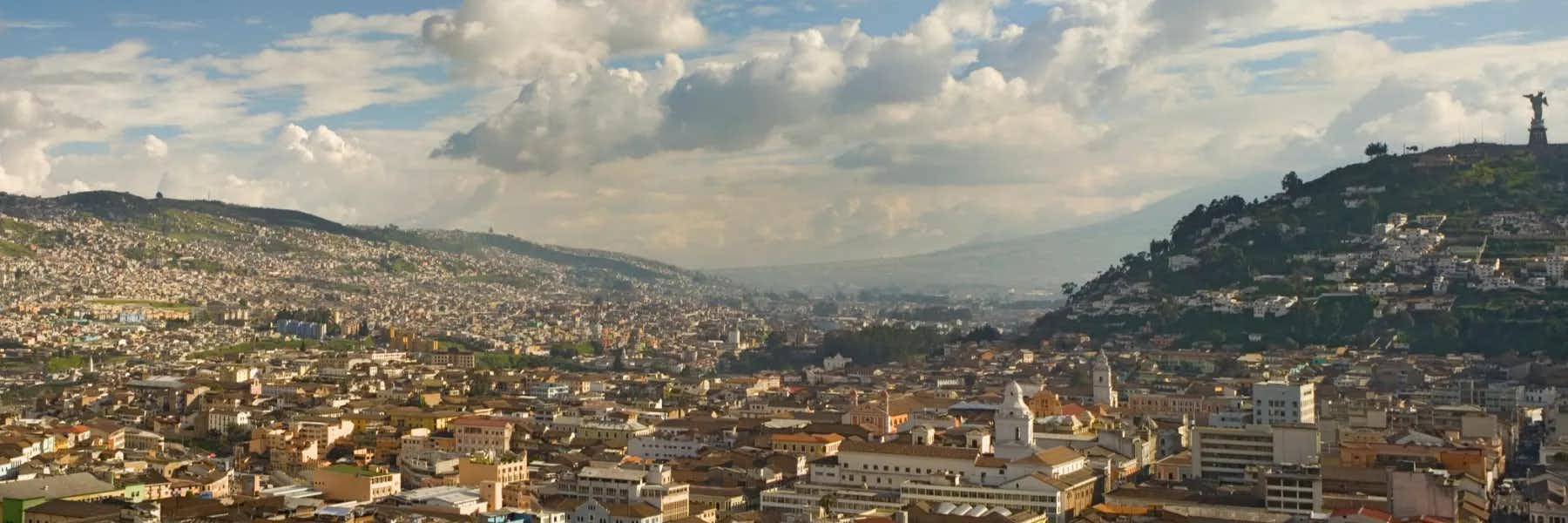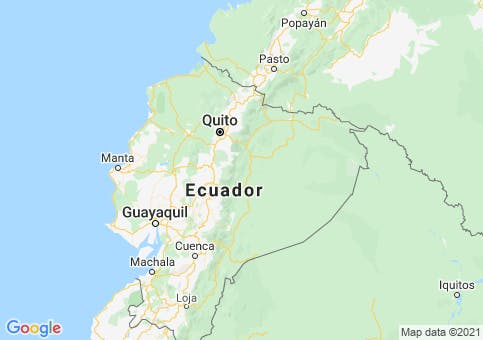By Fiona Mitchell
While it’s fair to say that most North Americans probably couldn’t pinpoint Ecuador on a world map, it has become an incredibly popular retirement destination for expats from North America over the last decade. This small South American country, sandwiched between its two better-known neighbors, Colombia and Peru, could easily fit into the state of Colorado, yet features a plethora of cultural and scenic delights.
Offering an affordable cost of living; incredible topographical extremes; climates to suit all tastes; first-world amenities and comforts; and excellent healthcare, Ecuador frequently ranks among the best retirement destinations worldwide in international travel and leisure publications.
Before you take the leap, however, it’s a good idea to make a scouting trip to the country to check it out for yourself. The good news is that North American citizens don’t need a visa to enter as a tourist and can stay for 90 days (extendable for another 90 days if desired), which gives plenty of time to explore. If you then decide that it’s the right place for you, it’s easy to apply for a two-year temporary residency visa from within Ecuador.
There are many types of visas available, and if you have evidence of a monthly income, such as from Social Security/pension, or the capacity to invest a modest part of your savings in the country, you should have no problem gaining residency. The whole process can take up to a few months and it’s a good idea to research exactly which documents you’ll need to bring from your home country. Some of these documents need to be legalized (apostilled) before you arrive in Ecuador—this will help to speed things up immensely.
When expats are asked why they chose to relocate to Ecuador, the three most common answers are the:
Low cost of living
Affordable healthcare
Excellent climate
Get Your Free Ecuador Report Here
Get Your Free Ecuador Report Here
Learn more about Ecuador and other countries in our daily postcard e-letter. Simply enter your email address below and we'll send you a FREE REPORT - Ecuador: Live Like Royalty on Your Social Security.
By submitting your email address, you will receive a free subscription to IL Postcards and special offers from International Living and our affiliates. You can unsubscribe at any time, and we encourage you to read more about our Privacy Policy.
Low Cost of Living
Although it’s not the cheapest country in South America, partly because its currency is the US dollar you’ll find that you can still live in Ecuador for just a fraction of what you would for a similar lifestyle in North America. Having the U.S. dollar as an official currency is actually beneficial, as it affords Ecuador far greater economic stability than many other countries in South America.
From bargain rental prices—as little as $500 per month for a nice apartment—to the incredibly low cost of fresh produce, your dollars go much further here. Many expats estimate that they live on about a third of what it would cost them for a similar lifestyle in their home countries—and they have much more time to enjoy their new life too, as they’re not having to work all hours of the day to afford it!
More on the Cost of Living in Ecuador here.
Affordable Healthcare
Affordable healthcare is one of the biggest draws, and you’ll find that many services in the private sector cost about a tenth of what they would at home. In fact, medical tourism is big in Ecuador, and many people come down to Cuenca, Guayaquil, and Quito, to have surgeries performed that they couldn’t otherwise afford.
Doctors in the large cities are highly trained, having often completed part of their residencies in the U.S. or Europe. Equipment is generally state-of-the-art and well maintained and appointments with practitioners are easy to schedule. Diagnostic imaging is also highly-affordable and you can usually obtain an MRI or CT scan within a day or two, for just a couple of hundred dollars. There is also a public health system, the IESS, which foreigners can buy into for under $80 per month, and many expats find this sufficient for their healthcare needs.
More on Healthcare in Ecuador here.
An Excellent Climate
In terms of climate, it very much depends on where you decide to settle, since there are distinct weather zones in the jungle, the mountains, and on the coast. Most expats choose to live either in the sierra (the Andean highlands) or along the Pacific coast. The climate is similar year-round because of the altitude in the mountains, from Ibarra in the north down to Cuenca in the south. It’s generally warm in the daytime, maxing out somewhere in the low 70s F, and cool at night, dipping down into the low 50s F.
Certain times of the year are wetter than others, but it’s generally safe to say that you won’t need AC or heating in any of these places. Vilcabamba, south of Cuenca and a little lower in elevation, is another popular expat destination and does tend to get warmer in the daytime, sometimes into the high 80s/low 90s F, but remains cool enough at night for sleeping.
The coast, of course, is much hotter given Ecuador’s location (and namesake) right on the Equator. It’s more humid than in the mountains, but if you’re living close enough to the ocean (which is very affordable here), then that breeze will make things much more pleasant. You can expect temperatures to be in the 80s or 90s F during the day, and perhaps down into the 70s F at night. Many locals don’t have AC and use stand-alone fans, but AC is becoming more common in higher-end hotels and among wealthier families. Wherever you choose to relocate, you can expect about 12 hours of daylight year-round, again due to the equatorial location – there is very little difference between sunrise and sunset throughout the year (typically 6 a.m. and 6.30 p.m.).
More on the Climate in Ecuador here.
Where is Right for Me?
One of the biggest decisions you’ll face if you decide to move to Ecuador is figuring out which part of the country is right for you. There are plenty of great options, but depending on what kind of climate you prefer, you can narrow down your choices a little.
Cuenca is the most popular expat destination for those who like the cooler mountain air. It’s a beautiful, colonial city with over 600,000 people, boasting big-city amenities, yet still has the feel of a small town. Expats love the year-round spring temperatures, the city’s walkability (particularly its extensive riverside trails), many great restaurants, and fascinating cultural attractions. It’s also flanked by the stunning Cajas National Park, where the mountains soar to over 14,000 feet, so is popular among hikers and adventure sport enthusiasts.
Quito offers much of the same, but on a far larger scale. More cultural and historic attractions abound, surrounded by even taller mountains and volcanoes. The capital also has an international airport with direct flights to the U.S. and Europe, so that’s a big draw for many expats. Also in the north of the country, the small city of Ibarra is becoming more popular with expats, enjoying a Californian-style drier climate, as well as boasting some beautiful mountain scenery and colorful indigenous culture in nearby Otavalo.
In the south of the country, tiny Vilcabamba is becoming increasingly popular with foreigners seeking a more unconventional, off-the-grid lifestyle—with an emphasis on organic food, alternative medical practices, and a bit of a hippy vibe. At 5,000 feet elevation, many also find the climate here to be just perfect. Nearby, the larger city of Loja is starting to see a growing expat community, attracted by its historic colonial center, vibrant music scene, and beautiful mountain surroundings, just a stone’s throw from Podocarpus National Park.
If you’re looking for hot weather and the laidback beach lifestyle, the resorts of Salinas, Playas, Ballenita, Olón, and Manta are all coastal expat havens. There are many small fishing villages dotting the coast that are also growing into expat enclaves, and with that comes more amenities for residents. Surfing, paragliding, whale watching, and diving are just some of the activities that can be enjoyed at certain times of year along Ecuador’s Pacific coast. Beachfront property can be found for surprisingly reasonable prices, the seafood is fresh and delicious, and you’ll never grow tired of those awe-inspiring Pacific Ocean views!
Ecuador is a pleasant surprise to many who have ended up calling it their adopted home. It’s easily accessible from the US (just over four hours direct flight from Miami,) it has the US dollar as its currency, and friendly and welcoming locals. Ecuador is also surprisingly modern and efficient, especially in the larger cities, which feature high-speed internet, good cell phone coverage, excellent public transport etc. Regarding public transport, there are great discounts for anyone over 65 years of age, including half price on transportation, reductions in taxes, discounts on utility bills. To top it all off, it’s an absolutely beautiful country with incredible cultural and natural diversity.
Safety
One major concern that potential expats often voice is: will I be safe in Ecuador? In today’s world, it’s hard to say that anywhere is completely “safe”, and South America, after all, has gained a reputation for drug trafficking and subsequent drug-related crime.
Yet most expats would say they feel safer in Ecuador than in their home countries. Mass shootings, for one, simply don’t happen here, since gun ownership among civilians is rare. You may be a little more vulnerable to petty crime, such as having your wallet lifted from your back pocket, but taking just a few common-sense precautions is generally enough to ensure you won’t have any problems.
Violent crime, as in most places, tends to be gang-related and is not directed at foreigners. You’ll generally find that people want to help you and make you feel welcome in their country. Just remember that Ecuador is a developing country and many people here do live in poverty, so don’t go flashing around your dollars!
More on Safety in Ecuador here.
The ABCs of Retiring to Ecuador
by Edd Staton
When my wife Cynthia and I were looking for places to relocate abroad the choices seemed overwhelming at first. It’s a big world out there, after all, so we decided to make a list of what was most important to us.
The field quickly narrowed when we realized the importance of being reasonably close to, and staying in touch with, our family. Asia sounded intriguing, but was just too far away. The thought of living in Europe was stimulating, but with the five-hour time difference we knew communication would be problematic.
Latin America offered the most possibilities to satisfy our wish list, and through research with International Living we discovered Ecuador, a small South American country that at the time we couldn’t have pinpointed on a map. More specifically we read about Cuenca, the country’s third largest city, which not only had we never heard of, but whose name we didn’t even know how to pronounce.
Yet something about Cuenca seemed to speak to us, so much so that we booked an investigative trip in July 2009. We were thrilled with what we found and moved to Cuenca in May 2010, happily living here ever since.
Let me share with you what I call the ABCs of what we love about our retirement in Ecuador:
A = Amazing Weather
As I’m writing this it’s July and I just finished speaking with our daughter on Skype. She was talking about her parched lawn, high utility bills, and sweating bullets. Six months from now we’ll be chatting about shoveling snow, high utility bills (again), and bundling up.
Here in Cuenca the sun is shining, the flowers are blooming, and the temperature is in the mid-70s F. When we have another conversation next January I’ll be experiencing the same thing.
It’s “winter” for us now, so the evenings can be cool on occasion. It’s also our “dry” season, but that only means it rains less often. Year-round the foliage remains lush and green. Since we don’t have (or need) central heating and air, our monthly utility bills remain constantly low.
Cynthia and I are “Goldilocks” people when it comes to weather—we want it not too hot and not too cold. For us Ecuador is “just right.”
B = Better Lifestyle
Work—chores—errands. I’m describing our previous lives in the States, but I’m guessing you can relate. We lived with so much stress, from daily rush hour commutes to constant deadlines and schedules, to financial worries.
Funny thing is, we didn’t realize this until we moved to Cuenca and escaped all that pressure. Now we find ourselves immersed in a culture where family is more important than career. Where if something doesn’t happen today maybe it will tomorrow. This can admittedly be annoying at times when you believe something really needs to happen today, but you learn to go with the flow and are often pleasantly surprised that maybe your important something wasn’t such a big deal after all.
Our relaxed way of life doesn’t mean we’re idle. On the contrary, our overall fitness level is better than it’s ever been as we walk almost everywhere in town and generally focus more on our exercise and diet. It helps that our markets overflow with non-GMO fresh fruits and vegetables.
But the biggest surprise of moving to Cuenca has been our often overly active social life. Expats here find that they now have the time to form and nurture deep and meaningful relationships. From our experience, such friendships add immeasurably to one’s quality of life.
C = Cost of Living
We love the U.S. and visit our family often; but we simply couldn’t afford to enjoy our retirement years there the way we had envisioned. In Cuenca our life, while not lavish, is filled with wonderful amenities—a weekly housekeeper, eating out whenever we like, memberships at the gym and yoga studio, and fresh flowers throughout our beautiful two story, penthouse apartment.
All of this is easily paid for with our Social Security checks. In fact we have money left over to travel throughout Ecuador and beyond. We would have never believed it possible, but we find ourselves living an overall better lifestyle here for a third of our monthly budget back in the States.
You’ll have your own reasons for wanting to move or retire outside the U.S.—and there are an ever-growing number of places around the globe that may make better sense for you other than Ecuador. But for Cynthia and me, Cuenca has been a beautiful and affordable place to call home.
Get Your Free Ecuador Report Here
Get Your Free Ecuador Report Here
Learn more about Ecuador and other countries in our daily postcard e-letter. Simply enter your email address below and we'll send you a FREE REPORT - Ecuador: Live Like Royalty on Your Social Security.
By submitting your email address, you will receive a free subscription to IL Postcards and special offers from International Living and our affiliates. You can unsubscribe at any time, and we encourage you to read more about our Privacy Policy.
Common FAQ’s About Retiring in Ecuador
How much does it cost to retire in Ecuador?
Ecuador is a very affordbale retirement option while still maintaining a high standard of living. A couple can live very well in Ecuador for between $1,600-$2,400 per month while the figure for a single person living in the town of Cuenca is $1,440 per month.
Can an American retire in Ecuador?
Yes Americans can retire in Ecuador. There are 13 different visa options for Americans who wasnt to retire in Ecuador. Most expats gain residence in Ecuador with a Pensioner’s visa. It is the preffered option for expats with retirement income.
Is Ecuador a safe place to retire?
Ecuador is a very safe place to retire. Expats living in Ecuador feel less stress and more relaxed than when they lived in the U.S. In general Ecuador is a very safe place although some expats do recommend taking more care when visiting the capital Quito.
Can US citizens own property in Ecuador?
Yes US citizens can own property in Ecuador as you do not need to be a resident to do so. Property ownership can actually help a US citizen qualify for residency in Ecuador.













